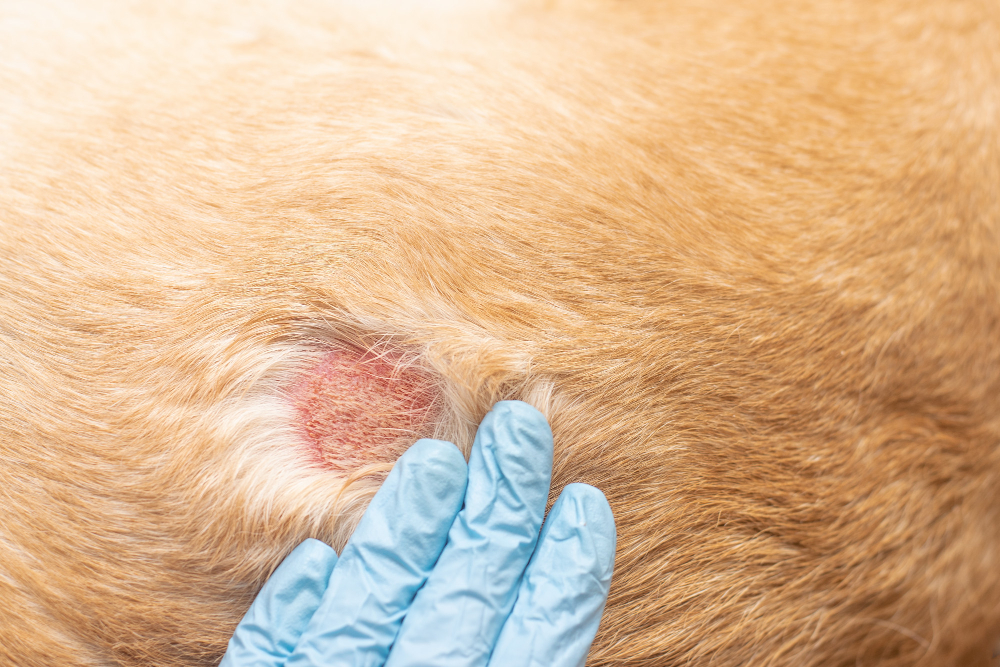Pet Dermatology
Here in the Southeastern United States, we see skin problems probably more than any other problem! Most pet owners are unaware that scratching, licking, biting, and chewing are tell-tale signs of an underlying skin problem.
Pet Dermatology in Toney, AL
While there are over 150 different skin diseases that can affect pets, managing skin problems is possible. Skin disease or irritation can cause distress. To relieve that suffering, we offer dermatological testing and treatment that can help your pet live comfortably.

Pet Dermatology
In trying to diagnose and treat skin disorders, your role as a pet owner is essential. Discovering what causes flare-ups and irritation will primarily be your job. Pay attention to your pet’s reaction after eating, playing outside, and interacting with other animals. During your appointment, the veterinarian will discuss your observations to determine a series of laboratory tests that will help diagnose or treat your pet’s skin issues.
Common dermatological issues for pets:
- Autoimmune disorders
- Chronic ear disease
- A disease of the foot
- Ear infections
- Flea allergy dermatitis
- Hair loss
- Hormone disorders
- Parasitic, bacterial, or fungal infections
- Skin allergies caused by contact, environment, or food
- Skin cancer
What does treatment involve?
Our veterinarian will work with you and your pet to determine a treatment plan that is manageable. Trying to find the best method of therapy is an ongoing process that may take several attempts in order to discover an effective treatment.
To help with diagnosis, we may perform the following tests to supplement our initial prognosis of your pet’s condition:
Biopsies – A biopsy is often performed to diagnose various skin cancers and autoimmune skin disorders. A biopsy is executed by removing the affected skin, processing it, and examining the sample under a microscope. By enlarging the area, the veterinarian can usually determine the underlying issue.
Allergy Testing – The intention of performing allergy testing is to discover exactly which allergens your pet reacts to. The test we use is a simple blood test. A sample of your pet’s blood is sent to the lab, where it is tested for the Southeast panel, which includes pine trees, oak trees, maple trees, ragweed, fescue grass, Bermuda grass, fleas, house dust, house dust mites and many more. Once we determine what your pet is allergic to, allergy serum is ordered, and we teach you to give your pet allergy injections that will hyposensitize your pet to the things it is allergic to. Your pet will receive one injection monthly after going through the initial build-up phase.
Skin Cultures – If your pet exhibits a skin disorder that is resistant to all previously tested forms of treatment, a skin culture is typically used to test numerous treatments at one time. This will help determine a successful treatment to heal the affected skin without continually unsettling your pet.
Skin Scrapings – This is done to make sure your pet does not have any type of mite involved in the skin problem. A few types of mites are contagious, while one is inherited.
Medicated Shampoos – Special shampoos can be of tremendous help to a pet with skin allergies! We have several types available.
Anti-Itching Medication – Fairly recent breakthroughs have made managing skin allergies incredibly easier. Our main two medications are Apoquel (a daily tablet) and Cytopoint (a monthly injection). These medications have truly changed and saved some pets” lives! We have witnessed firsthand some amazing transformations with these two medications. If your pet suffers from allergies, ask us about these medications today!
Prescription Pet Food – We have hypoallergenic diets for pets allergic to the actual food as well as diets that help pets who are allergic to environmental allergens. These diets can be additional help for these pets who truly suffer from itching and skin infections from severe allergies.
If you have any questions about pet dermatology or think your pet might have a skin condition, contact our office today.
